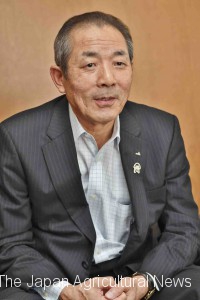TOKYO, Aug. 12 – Toru Nakaya, who became chairman of the Central Union of Agricultural Cooperatives in August, expressed determination to accomplish self-reform of the farm coops group. In an interview with The Japan Agricultural News, Nakaya said his organization, known as JA-ZENCHU, will have active discussion with the government and the ruling Liberal Democratic Party to carry out reform in a free and unbiased way, putting farmers first.
Q. How do you feel about becoming chairman of JA-ZENCHU when it is facing an extremely difficult situation?
A. I have been involved in agricultural cooperative movements for a long time, but there has never been a more challenging time than now. I will devote all my strength to accomplish the JA group’s self-reform. To be regarded as an indispensable organization by our members and the community is our biggest challenge.
The first and foremost goal of our reform is to boost farmers’ income. There are limits to their cost-cutting efforts and it is important to work on strengthening their bargaining power in order to increase their proceeds as much as possible. In addition to expanding direct sales and exports, we hope to hold campaigns to again promote consumption of domestically-grown farm produce along with the merits of washoku Japanese cuisine and Japanese diet to boost potential demand within the country.
Q. What are issues of concern in proceeding with self-reform?
A. According to a survey by the Ministry of Agriculture, Forestry and Fisheries, while more than 80 percent of agricultural cooperatives said they are working on revising their sales and purchase business, only 30 percent of certified farmers responded that farm coops in their region are making such efforts. We have to fill in such a perception gap. First of all, all the executives of local agricultural cooperatives must share a sense of crisis and make clear how they will reform their organizations. Furthermore, it is important for them to show their efforts to members of farm coops to seek understanding and support.
Q. How are you going to face the government and the ruling Liberal Democratic Party?
A. It is important for us to actively communicate and deepen understanding of each other. We will discuss reform from the aspect of whether the moves to be taken will be beneficial for farmers or not. We will offer suggestions from our side and if we see anything that would be disadvantageous to farmers, we will explain the reason why it should not be adopted. Cooperatives are autonomous and independent organizations. We will assume a strong attitude against moves that could face opposition of cooperatives’ members.
Agriculture minister Ken Saito has served as the head of the LDP’s Agriculture and Forestry Division and state minister of agriculture, forestry and fisheries. He is aware of the current situation of the agriculture industry and agricultural cooperatives’ standpoint. We hope to exchange opinions as we climb the path together to our common goal of maintaining and developing Japan’s agriculture.
Q. How will you cope with a number of agriculture policy issues?
A. Regarding sectors that are likely to be affected by the Economic Partnership Agreement concluded with the European Union, we will urge the government to take measures to ensure that farmers can maintain production.
Q. Some media reports said you are cautious about conducting reform.
A. I am neither cautious nor reformistic. I believe in a synthesis between tradition and innovation. There are things in the JA group that need to be protected, such as the principles of cooperatives, and things that need to be changed in line with the times.


